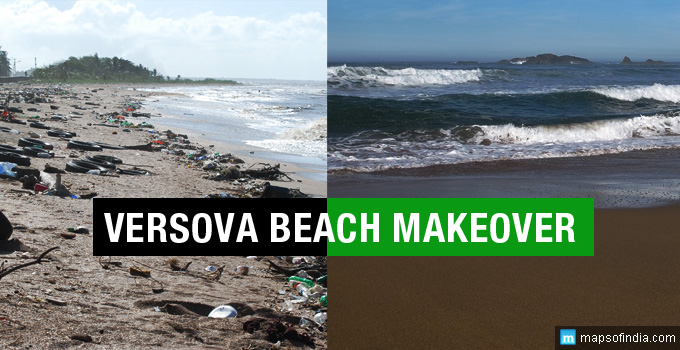Versova is an upmarket neighbourhood in north-western Mumbai. It has always been known for its beach and the Versova Fort. Facing the Arabian Sea, this beach has seen manmade destruction in the last few years with the entire area being strewn with garbage. Piles of trash and sewage contamination had made the Versova beach unsafe for visitors in recent years. A study conducted between November 2015 and May 2016 showed that Juhu, Versova and Aksa were the most polluted beaches.
Two years ago, inspired by Mumbai-based lawyer and environmentalist Afroze Shah, the residents of Versova decided to take proactive action towards cleaning the beach.
The Beginning of The Clean-up Drive and Its Success
It all began with Shah moving to his new apartment near Versova beach where he noticed plastic waste on the beach nearly 5.5 feet (1.67 meters) high in some portions. Shah took the matter in his own hands and along with his 84-year-old neighbour, Harbansh Mathur, began to clean up the trash. The neighbours soon got inspired and joined in the efforts as volunteers.
Approximately 50,000 kilograms of waste was removed during the first clean-up on the 2.5-kilometre shore. This was indeed the world’s largest beach clean-up, and that too conducted not by the government but the citizens themselves.
- A weekly clean-up drive was organised because the residents realised that there still remained tonnes of waste.
- More volunteers were invited to join the initiative of cleaning the beach.
- The local authorities also pooled in by providing tools such as garbage trucks and excavator machines for the volunteers in December, 2015.
- What started as a singular effort by an individual to clean the Versova Beach soon turned into a full-fledged movement over the next six months.
- 300 participants a week from all walks of life joined in the efforts and thus the volunteer base grew.
- The Versova Resident Volunteers (VRV) group was formed and they updated their progress regularly on Facebook.
- The movement started including the clean-up of the toilets near the beach to stop sewage from ending up in the sea.
- By March, 2017, in 43 weeks, VRV succeeded in clearing five million kilograms (5,000 metric tons) of trash from Versova beach alone.
VRV’s efforts did not go unnoticed even globally, and the United Nations Environment Programme (UNEP) called it the “world’s largest beach clean-up in history” in July, 2016. According to UNEP, 13 million tons of plastic waste end up in the world’s oceans every year and the world needs to act now.
Afroze Shah, the man behind this tremendous effort of cleaning the beach that had come to be known as one of the dirtiest in recent times, has received accolades from all over the world. PM Modi praised Shah’s initiative as an “inspiring example” in the fight against pollution. Shah’s achievement was also recognised by the UNEP and he was awarded with the United Nations’ highest environmental award, Champion of the Earth,.
What Shah has done can be done by every citizen of India. It is easy to blame the government and turn a blind eye. But it is time that every Indian realises that he/she has to be on the ground taking proactive steps to help with the Swachh Bharat Abhiyan by reducing plastic wastes and make waste disposal more efficient. This will help towards protecting the environment that nurtures us. The good news is that the initiative is spreading. The Maharashtra Maritime Board (MMB) plans to follow the same model to clean 19 other beaches including Madh, Marve, Gorai, Manori, Chimbai, Mahim, Aksa, Erangal, Uttan, Vasai, Dadar, Dana Pani, Silver, Hamla, Pirwadi Beach (Navi Mumbai), Girgaum Chowpatty, Juhu and Kalamb, and Marine Drive.
A clean-up drive for the Kahn (Khan) River in Indore has also been initiated. The Versova Beach success story hopefully will inspire people across India and the initiative will spread like wildfire.





